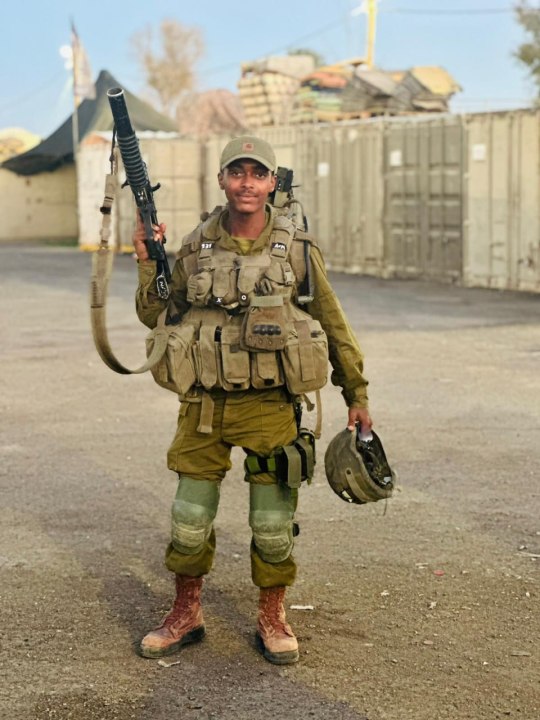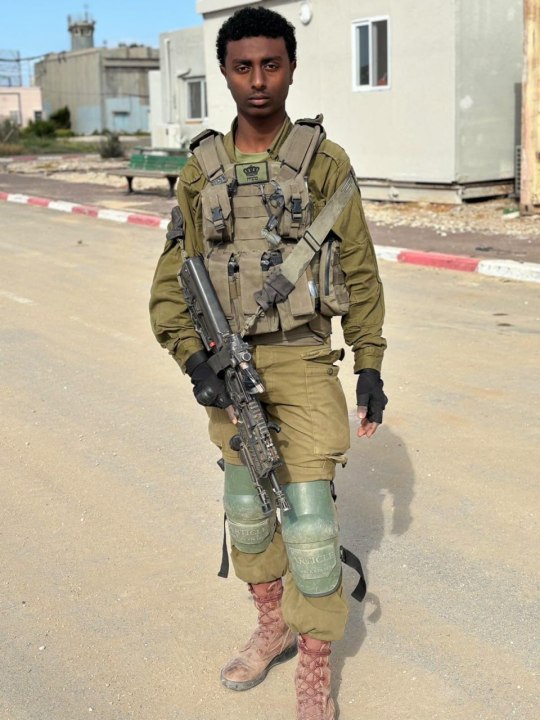#livni
Text





Patio and Pavilion, Architects: Pedro Livni, Rafael Solano
Montevideo, Uruguay. 2023
79 notes
·
View notes
Photo

Glacier Movement - Iceland
Photographer: Idan Livni
36 notes
·
View notes
Link
Álvaro Zinno (Montevideo, 1958) es un fotógrafo quien se caracteriza por la luz en sus trabajos así como la captura de espacios urbanísticos abandonados o raídos por el paso del tiempo.
0 notes
Text




Four Israeli soldiers were killed during fighting against Hamas in Gaza City's Zeitoun neighborhood this morning, the military announces.
The troops are named as:
Sgt. Itay Livny, 19, of the Nahal Brigade's 931st Battalion, from Ramat Hasharon.
Sgt. Yosef Dassa, 19, of the Nahal Brigade's 931st Battalion, from Kiryat Bialik.
Sgt. Ermiyas Mekuriyaw, 19, of the Nahal Brigade's 931st Battalion, from Beersheba.
Sgt. Daniel Levy, 19, of the Nahal Brigade's 931st Battalion, from Kiryat Motzkin
Another officer and soldier of the 931st Battalion were seriously wounded in the same incident.
According to an initial IDF probe, the four soldiers were killed by an explosive device or devices in an alleyway.
The troops had been raiding a school complex where the military had indications of Hamas activity. Weaponry and at least one tunnel was discovered in the area of the school.
Separately, another two soldiers of the 401st Armored Brigade's 9th Battalion were seriously wounded by RPG fire on a tank in the Rafah area of southern Gaza.
May their memories be a blessing.
48 notes
·
View notes
Text

"See how they want to fight jews! The hamas propaganda the summer camps!"
Israel deliberately calls themselves a jewish state. They have the Star of David on their flag on their soldier uniforms. Netanyahu recently spoke defending the destruction of Gaza by invoking the story of the tribe of Amalek. To say that Gazans are just like the biblical enemy and they have the divine right to destroy them. Israel presents "israeli" and "jew" as interchangeable
Jewish supremacy is well and alive in Palestine. Israeli jewish children are taught to think of palestinians as the enemy. And you can imagine when they are adults in college or in the army how they interact with palestinians.
Israelis are gonna get mad at the news source but..it's literally a book review of a book written by an Israeli about the anti palestinian and anti Arab racism in israeli schools. So...Israeli adults on tumblr were in these schools at the time these textbooks with their racist portrayals of palestinians were (and maybe still) there
At the height of Israel’s brutal 2008-09 assault on the Gaza Strip, then-foreign minister Tzipi Livni claimed that “Palestinians teach their children to hate us and we teach love thy neighbor” (232).
The first part of this myth is propagated by people like US Secretary of State Hillary Clinton, and more recently Newt Gingrich, who both spread the baseless claim that Palestinian schoolbooks teach anti-Semitism. This calumny originated with anti-Palestinian propagandandists such as Israeli settler Itamar Marcus and his “Palestinian Media Watch.”
In an important new book, Palestine in Israeli School Books, Israeli language and education professor Nurit Peled-Elhanan buries the second part of Livni’s myth once and for all.
Peled-Elhanan examines 17 Israeli school textbooks on history, geography and civic studies. Her conclusions are an indictment of the Israeli system of indoctrination and its cultivation of anti-Arab racism from an early age: “The books studied here harness the past to the benefit of the … Israeli policy of expansion, whether they were published during leftist or right-wing [education] ministries” (224).
She goes into great detail, examining and exposing the sometimes complex and subtle ways this is achieved. Her expertise in semiotics (the study of signs and symbols) comes to the fore.
Inculcation of anti-Palestinian ideology in the minds of Israel’s youth is achieved in the books through the use of exclusion and absence: “none of the textbooks studied here includes, whether verbally or visually, any positive cultural or social aspect of Palestinian life-world: neither literature nor poetry, neither history nor agriculture, neither art nor architecture, neither customs nor traditions are ever mentioned” (49)
On the occasions Palestinians (including Palestinian citizens of Israel) are mentioned, it is in an overwhelmingly negative, Orientalist and demeaning light: “all [the books] represent [Palestinians] in racist icons or demeaning classificatory images such as terrorists, refugees and primitive farmers — the three ‘problems’ they constitute for Israel” (49).
“For example in MTII [Modern Times II, a 1999 history text book] there are only two photographs of Palestinians, one of face-covered Palestinian children throwing stones ‘at our forces’ … [t]he other photograph is of ‘refugees’ … placed in a nameless street” (72).
This what Peled-Elhanan terms “strategies of negative representation.” She explains that “Palestinians are often referred to as ‘the Palestinian problem.’” While this expression is even used by writers considered “progressive,” the term “was salient in the ultra-right-wing ideology and propaganda of Meir Kahane,” the late Israeli politician and rabbi who openly called for the Palestinians to be expelled. Peled-Elhanan finds this disturbing, coming as it does “only 60 years after the Jews were called ‘The Jewish Problem’ ” (65).
She reprints examples of the crude Orientalist cartoon representations of Arabs, “imported into Israeli school book [sic] from European illustrations of books such as The Arabian Nights” (74). Arab men stand, dressed in Oriental garb, often riding camels. The cartoons of Arab women show them seated submissively, dressed in traditional outfits. Meanwhile, two Israelis on the same page are “depicted as a ‘normal’ — though caricaturistic — Western couple, unmarked by any ‘Jewish’ or ‘other’ object-signs” (110-11). The message is clear: Arabs do not belong here with “us.”
42 notes
·
View notes
Photo

The Room Behind the Wall by livni+ https://thisispaper.com/mag/the-room-behind-the-wall-livni
109 notes
·
View notes
Note
are there any politicians or political parties in israel that you support? if so what does that support look like? (as in, is it voting, voter outreach, rallies, etc.)
There are singular politicians that I like but unfortunately theyre part of parties filled to the brim with incompetent kleptocrats whom I will never vote for. I appreciate Sharren Haskel, who defected from the Likkud when it stopped being the Likkud and became BBs rimming brigade. I appreciate Merav Michaeli despite disagreeing with her on almost every belief she holds. Shes a principled politician and a strong leader, despite what ppl may think of her post-Labor destruction (which she wasnt the catalyst of, yall r just salty!). Would let her spank me but would not vote for her ever. I LOVED Tzipi Livni and to this day she is the only politician I am willing to actually vote for. Pls come back Tzipi we desperately need you :(
22 notes
·
View notes
Text
youtube
How the global response teaches Israel an important lesson: occupation is bad, war is worse
Translation:
One cannot open the TV nowadays without hearing the latest security senior calling for the war to end
And what about crumbling Hamas and killing Sinwar? about that, don't worry, they say, we'll always be able to renew the fire
"We are ending the war"
"To stop the war"
"The stopping of the war"
"To stop the war"
"With very harsh conditions to Hamas"
"At the first UAE-"
Withdrawal from Gaza? Leaving an armed Palestinian terrorist organization, It's familiar to me from somewhere
For example, the Oslo accords! Even back then we talked about a withdrawal of the IDF forces from Gaza and leaving there an armed terrorist organization, in that case the PLO
The leftist prophet, the great author Amos Oz is writing thus even 30 years ago
"If the terrorist will continue with the terror, well in that case Israel will be able to close on Palestine and destroy it"
The end is known - The Palestinians have continued with the terror, we hadn't destroyed Palestine, and the first to call not to destroy it, is Amos Oz himself
7 years later, it's about withdrawal from south Lebanon, from the security belt that Israel was in for many years.
Then Prime minister, Ehud Barak, is saying "we'll withdraw" but he's calming: "If they only shoot one bullet at us, we'll get in and bomb them with all the force"
"I want to see the person who dares to, with these conditions, shoot towards the IDF soldiers, or the settlements. We will know how to respond and what to do."
Not to talk, of course, about the disengagement in 2005: Then PM: Ariel Sharon is saying, warning, the eve of the disengagement: "Those who will continue to attack us will meet the IDF and the security forces in their full force"
One of the returning reasons for withdrawals is the claim that when the IDF forces work outside the sovereign borders of the state, they hurt its legitimization, and so if we'll withdraw to the international border, we'll recharge the legitimization, and then we'll be able to use that battery to attack them with all force if they only dare to attack us.
It's hard to believe but in the final discussion about the disengagement 20 years ago, then Justice minister Tomy Lapid had explained that the antisemitism in the world and the universities, is because we are acting in Gaza:
"We are slowly but surely becoming outcasts. They try to boycott us, universities don't want to see Israeli speakers! Jewish students in the USA are suffering because of us! because the videos and photos they see every evening, every evening, in every TV station are showing us as a cruel occupier"
So what is the solution? to withdraw! A. as we said, it is totally reversible, and B. it will give us legitimization!
Listen to Meri Shitrit, this is huge:
"We'll state a fact to the world: we are out of the Gaza Strip, and the Palestinians have no reason to attack us, and if they attack us anyway, no one will come with complaints to us if we attack them with every weapon, with all the force, beyond the border, no need to stay in Gaza for that! who will then be able to come with complaints to us? when we evacuate the land, saying 'Here! establish your lives, manage them, we are ready to help you!' no one will come with complaints to us"
"The world is waiting for the Palestinian response: a reached hand for peace, or terror fire? to the reached hand we'll respond with an olive branch, but to the fire we'll respond with fire harder than ever"
'harder than ever' now, in our sorrow, we are in an experiment that is going for almost 20 years: the group of the experiment: the Gaza Strip, the control group: Judea and Samaria. from the Gaza Strip we withdrew, to Judea and Samaria we entered
So where would you expect the international outlook will be worse? of course, in Judea and Samaria! only that in reality the exact reverse had happened
In 2009 then state minister Tzipi Livni, Not exactly an Itamar Ben Gvir, gets out in the last moment from an arrest in London due to the cast lead operation, in Gaza
In 2010 mass demonstrations in Europe because of the Marmara's advance towards? Gaza
After that, the Goldstone report in the same year, accuses Israel in war crimes, not in Judea and Samaria, in Gaza!
And of course the international arrest warrants they had deployed now [2024] after a terrible massacre of 1500 people? In the Gaza Strip
In the eyes of the world, when you run away, evacuates and dis-root [your civilians], you don't get international credit, but rather pay a debt to he who [by the look of your own actions], the land is probably his
Debt with gray market interest, and if we know anything about gray markets, is that in the end, the bullies will always knock on your door, with a large bat and with a debt to pay
#gaza#israel#hamas#israel palestine conflict#gaza strip#palestine#palestinian#hammas is isis#jerusalem#israel news#israeli#i stand with israel#pro israel#jewish history#jewish#jewblr#jewish tumblr#jumblr#am yisrael chai#judaism#טאמבלר ישראלי#טמבלר ישראלי#ישראל#ישראלבלר#ישראלים#עם ישראל חי#עברית#חרבות ברזל#ישר#ישראבלר
13 notes
·
View notes
Text
Over the last two months of war in the Middle East, no one in Washington or anywhere else has come up with a good idea about what should happen in the Gaza Strip when the fighting there ends. At the same time, everyone seems to agree that Israel’s reoccupation of Gaza is a bad idea. The Biden administration has already warned the Israeli government that it would not support such a return to military administration of the area.
Still, the likelihood of a renewed Israeli occupation is greater than many might suspect. That is because Israelis want security, and all of the present ideas for Gaza are unworkable or politically untenable (or both). At the same time, the Israelis regard the fight with Hamas in existential terms and thus seem willing to countenance international opprobrium if that is the cost of survival.
In thinking about “the day after” in Gaza, it is important to understand some details about Israel’s 2005 withdrawal from the territory. When then-Prime Minister Ariel Sharon determined that Israel’s occupation of the Gaza Strip was no longer worth the cost, many Israelis agreed. There was no convincing reason to stay.
Unlike the West Bank, the Gaza Strip was never part of the historical Land of Israel. And though security there remained fraught in the waning days of the Second Intifada, the leadership of the Israel Defense Forces (IDF) believed it to be manageable, even if troops were no longer in the territory itself. What’s more, Israel would get credit around the world for uprooting settlements and leaving the area. Left unstated was that, for Sharon, withdrawal from Gaza would free up resources to continue his efforts to tighten Israel’s grip on those parts of the West Bank he intended would always remain under Israeli control.
To many in Israel, occupation of the Gaza Strip was the poison chalice of the June 1967 victory, and handing it over to the Palestinian Authority (PA) seemed like a win. Yet not all Israelis were so supportive. The settlers decried what they perceived to be Sharon’s betrayal, and some resisted. Then-Transportation Minister Avigdor Lieberman was forced out of the government over his opposition. And the Likud party split. Sharon—along with well-known Likudniks such as Ehud Olmert and Tzipi Livni—formed a new party called Kadima. For Lieberman and other opponents, including former Knesset Speaker Yuli Edelstein, it was a mistake to believe that withdrawal from Gaza would produce either goodwill or security. Contrary to Sharon, they believed that the best way to ensure the safety of Israelis in sovereign Israel was to continue the occupation of Gaza.
In the ensuing years, as rockets fired from Gaza have fallen on Israel at regular intervals since the withdrawal and the United Nations has continued to criticize Israel for an occupation that many Israelis say does not exist, the Israeli right has maintained that Sharon’s withdrawal was a grave mistake. It is a view that seems to have gained more traction in Israel since the terrorist attacks of Oct. 7. In a poll conducted not long thereafter, 30 percent of Israelis supported an occupation and military administration of Gaza.
Of course, that poll was conducted in the immediate aftermath of the worst security failure in the history of the state. No doubt, in bloodied and wounded Israel, emotions were (and still are) running high. It could very well be that far fewer Israelis want to reoccupy Gaza than the poll reflects. But that does not diminish the fact that opponents of the 2005 withdrawal have a more compelling narrative now than they did then: When Israel occupied the Gaza Strip, there was relative calm and few, if any, rockets fell on the country; since the IDF left, there have been nothing but mini-wars (2008-09, 2012, 2014, 2021) and now a full-scale conflict.
I am told that no one in the Israeli defense establishment—the same people who blew off warnings about Hamas’s plans for years—wants to occupy Gaza again. Defense Minister Yoav Gallant has gone so far as to declare that the third phase of the war “will require the removal of Israel’s responsibility for life in the Gaza strip, and the establishment of a new security reality for the citizens of Israel,” suggesting that after Hamas is destroyed, the IDF will leave Gaza and seal it off from Israel. That may be his (unrealistic) intention, but that is not necessarily what others are saying.
On Nov. 6, Israeli Prime Minister Benjamin Netanyahu told ABC News that “Israel will, for an indefinite period … have the overall security responsibility [in Gaza] because we’ve seen what happens when we don’t have it.” Of course, the prime minister did not affirmatively state that the IDF would occupy Gaza and administer it after the war, but he did not not say that, either.
Then there is Israeli Minister of Strategic Affairs Ron Dermer, one of Netanyahu’s closest advisors. Recently, Dermer pointed out to reporters that the Israeli military had not been in Gaza for 17 years and thus had not been able to undertake the kinds of security operations it routinely undertakes in the West Bank—implying that the 2005 withdrawal had compromised Israel’s security. He went on to say, “Obviously, we can’t repeat (this),” affirming what Netanyahu had previously stated, notably that the IDF will have “overriding security responsibility indefinitely” in Gaza.
From this, it seems they are suggesting that the best way to secure Israel is through occupation; but, of course, there is a certain amount of circumlocution in both men’s words. If, however, they were opposed to reoccupation, it would be easy to say, “We oppose occupation, but we will secure sovereign Israel by doing X, Y, and Z.”
Even if Netanyahu does not mean what he seems to be saying, or if he does but Israeli politics ensures that he is not in power one way or another after the war, a reoccupation of the Gaza Strip may still be the conflict’s outcome. Let’s run through a thought experiment: Assume the Israeli leadership does not want to occupy the Gaza Strip. Also assume that the destruction of Hamas remains Israel’s objective. And assume that the Israeli public remains quite hawkish. Now assume that neither Washington nor any of the other major global or regional powers can devise a workable and politically tenable plan for postwar Gaza. What exactly are the Israelis left with?
The Biden administration’s current plan, parts of which have been publicly articulated by Secretary of State Antony Blinken, would see some type of international stabilization of Gaza until a reinvigorated PA can assume control, followed by a resumption of the U.S. search for a two-state solution.
Every part of this plan is unrealistic. There is unlikely to be a multinational force in Gaza because it will be exceedingly dangerous even if Israel were to render Hamas incapable of threatening Israeli security. The PA is so hobbled by corruption, dysfunction, and a lack of legitimacy—due to its dependence on and coordination with Israel as well as the fact that Palestinian leader Mahmoud Abbas refuses to stand for election—that it is beyond help. Even if it could be rehabilitated, Netanyahu and his advisors have made it clear that they do not regard the PA as a partner, and for their part, Palestinian leaders in Ramallah have made clear they will not be Israel’s proconsul in the Gaza Strip. Finally, it does not seem likely that U.S. policymakers have much to offer that has not been tried before to push Israelis and Palestinians to make peace.
Whether the Israeli public wants to occupy the Gaza Strip remains an open question, but as Israeli friends and interlocutors have relayed to me over the past two months, they are confronted with an impossible situation in the current conflict. They want nothing more than to wash their hands of the Palestinian issue and to have security. They thought withdrawal from Gaza would advance those goals, but the Oct. 7 attacks shattered that belief. That is why no one should be surprised when the Israelis reoccupy Gaza. For Israelis who crave security, there is likely no other choice.
6 notes
·
View notes
Text

Livni Café & Bakery: pistachio croissant
5 notes
·
View notes
Photo

Ливни затопили китайский регион Гуанси
Сильные ливни затопили регион Гуанси в Китае.
Читать далее
Подробнее https://7ooo.ru/group/2024/05/19/863-livni-zatopili-kitayskiy-region-guansi-grss-308913525.html
0 notes
Text
Les noms de quatre soldats du nord tues dans la bande de Gaza autorisés à être publiés
Les noms de quatre soldats de Tsahal dont les familles ont été informées ont été autorisés à être publiés.
Les noms des quatre soldats sont :
– Le sergent Itay Livny, 19 ans, de Ramat Hasharon, combattant du bataillon 931, la brigade Nahal, tombé au nord de la bande de Gaza.
– Le sergent Yosef Dassa, 19 ans, de Kiryat Bialik, combattant du bataillon 931, la brigade Nahal, est tombé au combat…

View On WordPress
0 notes
Text
Bebi-tur
Bebi-tur (Serie 2023)
#AnnaKotova #DmitriyKulichkov #EvgeniyaDmitrieva #EgorDruzhinin #AnastasiyaPopova #LinaMirimskaya
Mehr auf:
Serie / Бэби-тур Jahr: 2023- (Juni)
Genre: Comedy
Hauptrollen: Anna Kotova, Dmitriy Kulichkov, Evgeniya Dmitrieva, Egor Druzhinin, Anastasiya Popova, Lina Mirimskaya, Mikhail Khuranov, Elizaveta Lotova, Valentin Samokhin, Aleksandr Zolotovitskiy, Svetlana Svibilskaya, Yevgeniy Shumeyko …
Serienbeschreibung: Im Jahr 2009, in dem kleinen russischen Dorf Livni, geht die Hauptfigur, die lebhafte…

View On WordPress
0 notes
Text
The Cost of Nuclear War in Space
Putting a weapon into orbit is not just a military threat. It’s also a risk to the billions of dollars pouring into the space economy.
https://www.nytimes.com/2024/02/24/business/dealbook/the-cost-of-nuclear-war-in-space.html By Ephrat Livni and Vivienne Walt
Just before the Russian-Ukrainian war reached its two-year milestone today, U.S. intelligence agencies warned that Russia might aim a…

View On WordPress
0 notes
Text
Antonio Velardo shares: The F.T.C. Takes on A.I. Deals by Andrew Ross Sorkin, Ravi Mattu, Bernhard Warner, Sarah Kessler, Michael J. de la Merced, Lauren Hirsch and Ephrat Livni
By Andrew Ross Sorkin, Ravi Mattu, Bernhard Warner, Sarah Kessler, Michael J. de la Merced, Lauren Hirsch and Ephrat Livni
The agency is concerned that transactions including Microsoft’s $13 billion investment in OpenAI could hinder competition and innovation.
Published: January 26, 2024 at 07:48AM
from NYT Business https://ift.tt/f46exJb
via IFTTT

View On WordPress
0 notes
